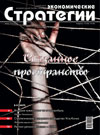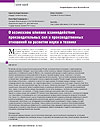On the Possible Impact of Productive Forces Interaction with Production Relations on the Science and Technology Development
According to the authors, external and internal challenges of Russia, its geopolitical position, as well as Jesuit Wester Russophobia encourage our country to join the group of undisputed leaders of global economic, social and political development. At the same time, preservation of production relations, existing in our socio-economic system now, is a powerful brake on the way of scientific and technological progress and causes significant underdevelopment of the societyэs productive forces. Such a state of productive force does not provide necessary qualitative leap in the social development of Russia and creates unsatisfactory prospects for its safe, sovereign and holistic existence. A systematic approach to the nature and essence of the productive force proves that the main and the single productive force of our society can only be a man, his immediate work. At the same time, the scientific-technological revolution (STR) and the process of conditionally digital socialization (education) are the dominant conditions for effective development of productive force. However, the lack of balance between individuals’ education and upbringing inevitably leads to manifestation of scientific and technical extremism, which can create conditions for destruction of the biosocium itself. One of the main results of scientific-technological revolution is also transformation of scientific and technical production into the first stage of social reproduction, while industrial-manufacturing production is postponed to the second stage. In addition, the key to scientific-technical leap is creating conditions for effective early identification of individuals with the highest level of biological sociality inclinations (with an increased ability to education and training) and their subsequent highly effective socialization (first of all, we are speaking about development of scientific and creative thinking). The main scientific-technical and socio-political condition, providing maximum efficiency of socialization of such individuals and transformation of scientific-technical production into accelerator of social reproduction, is bringing in equivalence production relations and the productive force of society.
References:
- Aganbegyan A.G. Chelovecheskiy kapital i ego glavnaya sostavlyayushchaya — sfera “ekonomiki znaniy” kak osnovnoy istochnik sotsial’no-ekonomicheskogo rosta [Human Capital and Its Main Component — the “Knowledge Economy” Sphere as the Main Source of Socio-Economic Growth]. Ekonomicheskie strategii, 2017, no 3, pp. 66–79.
- Zotin A. Robovladel’cheskiy stroy. Kak my budem zhit’ pri superkapitalizme [The Slave System. How Will We Live When Supercapitalism]. Kommersant, 2017, November, 4, available at: https://www.kommersant.ru/doc/3455179.
- Moreeva E.V. Ot proletariata k prekariatu: aktual’nost’ klassovogo podkhoda [From Proletariat to Precariat: the Relevance of Class-Based Approach]. MON RK. Rossiyskoe filosofskoe obshchestvo “Dialektika i kul’tura”. Sb. nauch. Statey, Ust’-Kamenogorsk, 2017, p. 115.
- Gavrilov S.D. Nauchno-tekhnicheskiy progress i obuchenie novykh pokoleniy [Scientific and Technological Progress and Training of New Generations]. PRoATOM, 2006, November, 10, available at: http://www.proatom.ru/modules.php?name=News&file=article&sid=705.
- Forrester Dzh. Mirovaya ekonomika [World Economy]. Moscow, AST, 2003, p. 30.
- Glaz’ev S.Yu. Dogmatizm i nauchnaya revolyutsiya v ekonomike [Dogmatism and Scientific Revolution in the Economy]. Ekonomicheskie strategii, 2016, no 5, pp. 6–13.
- Amosov N.M. O prirode cheloveka [About the Nature of Man]. Fizkul’tura i zdorov’e, 1992, no 9–10, pp. 4–6, 12, 13.
- Kharari Yu.N. Sapiens: Kratkaya istoriya chelovechestva [Sapiens: a Brief History of Mankind]. Moscow, Sindbad, 2016, pp. 49, 501.
- Dokenz R. Egoistichnyy gen [Is a Selfish Gene]. Moscow, AST, 2013, p. 119.
- Biryukov A.A. Dialektika “Nakopleniya kapitala” Rozy Lyuksemburg [Dialectics of the “Accumulation of Capital” Rosa Luxemburg]. Filosofiya i obshchestvo, 2013, no 4 (72).
- Biryukov A.A. Izbytochnoe chelovechestvo? Mal’tuzianstvo i marksizm o probleme “lishnikh lyudey” [Surplus Humanity? Malthusianism and Marxism on the Problem of “Extra People”]. Voprosy filosofii, 2015, no 12, p. 54.
- Mart’yanov V. Proshchay, sredniy klass [Good-bye Middle Class]. Svobodnaya mysl’, 2017, no 6.
- Nikol’skaya G.K. Gosudarstvennaya immigratsionnaya politika SShA [The State Immigration Policy of the United States]. Moscow, IMEMO RAN, 2015, p. 62.
- Efroimson V.P. Genial’nost’ i genetika [The Genius of Genetics]. Moscow, Russkiy mir, 1998, pp. 20–21.
- Burmistrov A.N., Il’in Yu.V. O nekotorykh osnovakh formirovaniya i funktsionirovaniya tselostnoy ekonomicheskoy sistemy [On Some Fundamentals of an Integrated Economic System Forming and Functioning]. Ekonomicheskie strategii, 2016, no 7, pp. 174–181.
- Burmistrov A.N., Il’in Yu.V. Ob osobennostyakh aktsionirovaniya predpriyatiy pri formirovanii tselostnoy ekonomicheskoy sistemy [On Peculiarities of Enterprises Demutualization While Forming Integrated Economic System]. Ekonomicheskie strategii, 2016, no 4, pp. 178–185.
- Burmistrov A.N., Il’in Yu.V. O prirode korruptsii I vozmozhnosti ee podavleniya [On the Nature of Corruption and Possibility of Its Suppression]. Ekonomicheskie strategii, 2017, no 8, pp. 196–212.



